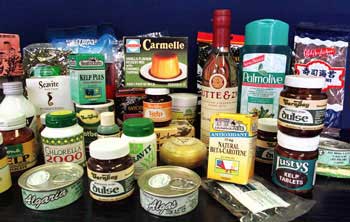Seaweed uses and utilization
Seaweeds are used in many maritime countries as a source of food, for industrial applications and as a fertiliser. The major utilisation of these plants as food is in Asia, particularly Japan, Korea and China, where seaweed cultivation has become a major industry. In most western countries, food and animal consumption is restricted and there has not been any major pressure to develop seaweed cultivation techniques. This present and potential uses of seaweeds. Industrial utilisation is at present largely confined to extraction for phycocolloids and, to a much lesser extent, certain fine biochemicals. Fermentation and pyrolysis are not been carried out on an industrial scale at present but are possible options for the 21st century.
The present uses of seaweeds at present are as human foods, cosmetics, fertilisers, and for the extraction of industrial gums and chemicals. They have the potential to be used as a source of long- and short-chain chemicals with medicinal and industrial uses. Marine algae may also be used as energy-collectors and potentially useful substances may be extracted by fermentation and pyrolysis. The picture shows some of the many seaweed products or products containing seaweed available today, all of these are made by Irish companies and/or from Irish seaweed.

-
 BioAtlantis
provides sustainable technologies from the sea to enhance
plant, animal and human health.
BioAtlantis
provides sustainable technologies from the sea to enhance
plant, animal and human health.
-
 Connemara Organic Seaweed Company
provide hand harvested, sustainable, kelp and seaweed products
for human consumption through health supplements and edible
products.
Connemara Organic Seaweed Company
provide hand harvested, sustainable, kelp and seaweed products
for human consumption through health supplements and edible
products.
-
 Emerald Isle Organic Irish Seaweed.
A family business producing seaweed as supplements,
cooking, gardening and bath products.
Emerald Isle Organic Irish Seaweed.
A family business producing seaweed as supplements,
cooking, gardening and bath products.
-
 Irish Seaweeds Ltd
are suppliers of 100% natural hand-harvested seaweeds and
edible sea vegetable products from Ireland.
Irish Seaweeds Ltd
are suppliers of 100% natural hand-harvested seaweeds and
edible sea vegetable products from Ireland.
